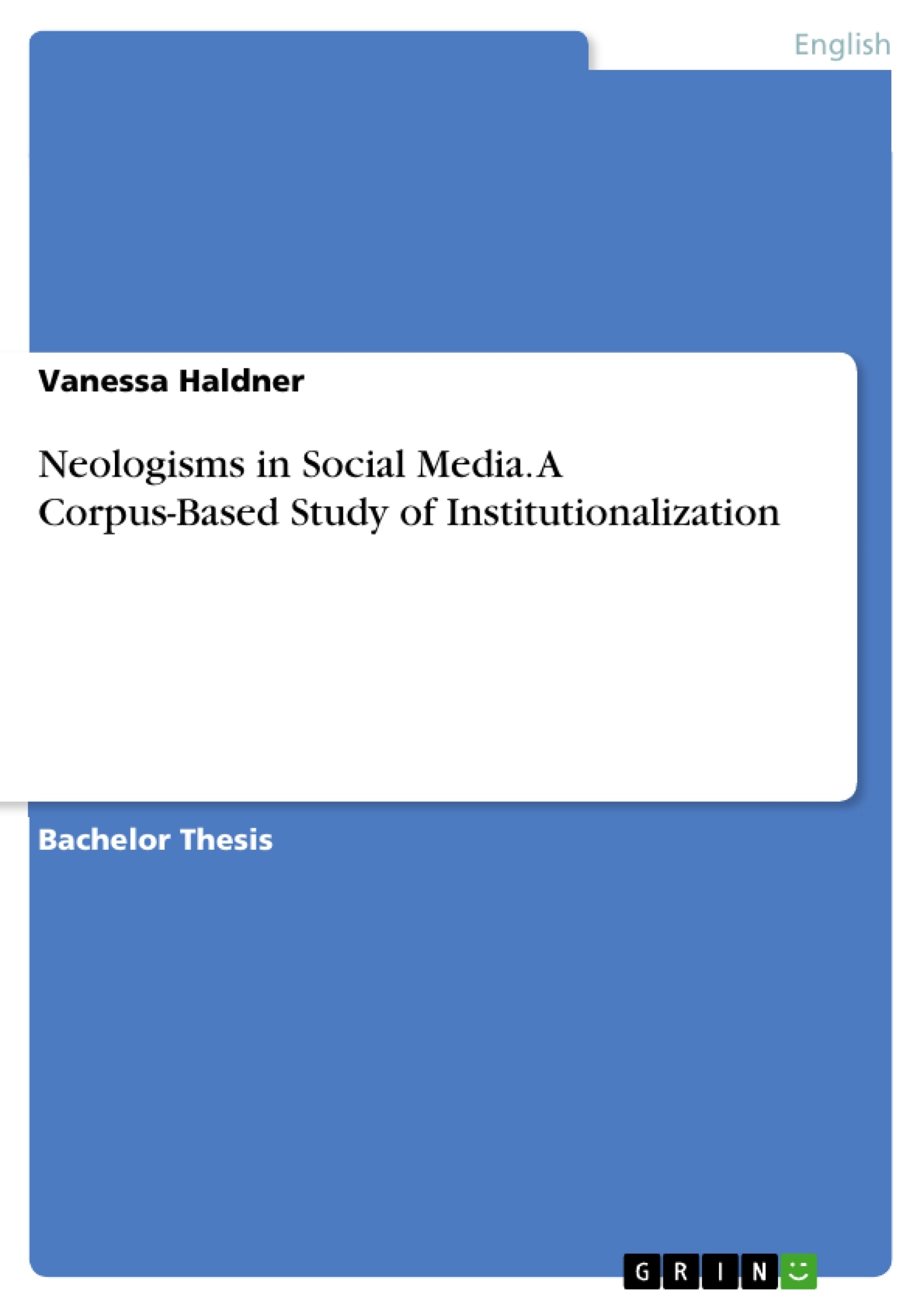The aim of this study is to investigate the institutionalization of neologisms in social media, more precisely in blogs, with a geographical view to the countries where English is the first or second official language. Especially since globalization and social media become increasingly integrated into our daily life, it is a phenomenon worth investigating. Neologisms belong to the process of word-formation; thus, this thesis belongs to the field of lexicology.
The structure of the work at hand is as follows. First, there will be a concise review on the relevant theory on World Englishes and the institutionalization process of neologisms. It should demonstrate the impact of language change. Further, the data source, the corpus of Global Web-based English, will be described and the method used for the analysis will be explained. The following step includes the corpus analysis and inspects several neologisms regarding various categories. Afterwards, a presentation and evaluation of the results helps to assess the hypothesis. Lastly, a summary and interpretation of the findings concludes this thesis and gives an outlook on further research opportunities.
Inhaltsverzeichnis (Table of Contents)
- 1 Introduction
- 2 Theoretical Framework
- 2.1 English in a Global Context - Kachru's "Three Circle Model"
- 2.2 Roswitha Fischer - "Lexical Change in Present-Day English"
- 2.2.1 The Concept of Neologisms
- 2.2.2 Motivation
- 2.2.3 Productivity
- 2.2.4 Institutionalization
- 2.3 Hypothesis
- 3 Practical Part
- 3.1 Data
- 3.2 Method
- 4 Results & Discussion
- 4.1 Results
- 4.2 Discussion
- 5 Conclusion
Zielsetzung und Themenschwerpunkte (Objectives and Key Themes)
This study aims to investigate the institutionalization of neologisms in social media, specifically in blogs, within countries where English is the first or second official language. This research examines the impact of language change, particularly driven by globalization and the rise of social media, on the vocabulary of English.
- The role of social media, particularly blogs, in language change and the emergence of neologisms.
- The process of institutionalization of neologisms within the global English-speaking world.
- The influence of technology and digitalization on the development of new terms.
- The impact of World Englishes and their contributions to the vocabulary expansion of English.
- The analysis of neologisms found in a corpus of Global Web-based English.
Zusammenfassung der Kapitel (Chapter Summaries)
- Chapter 1: Introduction
The introduction establishes the context for the study by discussing the phenomenon of neologisms, their significance in language change, and the role of social media as a driver for new vocabulary.
- Chapter 2: Theoretical Framework
This chapter provides a theoretical background for the study by examining Kachru's "Three Circle Model" and Roswitha Fischer's work on lexical change in English. It delves into the concepts of neologisms, their motivation, productivity, and the crucial process of institutionalization.
- Chapter 3: Practical Part
The practical part outlines the data source, which is the "Global Web-based English" corpus, and the methodology used for analyzing the data. It provides detailed information on how the corpus was selected and the specific methods employed for analyzing neologisms.
- Chapter 4: Results & Discussion
This chapter presents the results of the corpus analysis, focusing on various categories of neologisms and their observed frequencies. It also discusses the findings and their implications for the understanding of language change and the impact of social media on vocabulary.
Schlüsselwörter (Keywords)
This research centers on neologisms, language change, social media, blogs, World Englishes, institutionalization, corpus linguistics, and the "Global Web-based English" corpus. The study delves into the interplay of these concepts to explore the impact of globalized communication and digitalization on the evolution of English vocabulary.
Frequently Asked Questions
What are neologisms in the context of social media?
Neologisms are newly coined words or expressions. In social media, they often emerge from technological changes or new cultural trends and spread rapidly through platforms like blogs or Twitter.
How does the institutionalization of new words work?
Institutionalization is the process by which a new word becomes accepted and used by a larger speech community, eventually finding its way into dictionaries and standard language use.
What is Kachru's "Three Circle Model"?
It is a model that categorizes English speakers into three circles: the Inner Circle (native speakers), the Outer Circle (English as a second language), and the Expanding Circle (English as a foreign language).
Why are blogs significant for language change?
Blogs provide a platform for informal, public writing where new terms can be tested and popularized quickly, acting as a bridge between private speech and formal written language.
What is the "Global Web-based English" (GloWbE) corpus?
GloWbE is a massive collection of texts from the internet (blogs, websites) used by linguists to study how English is used differently across 20 different countries.
- Citar trabajo
- Vanessa Haldner (Autor), 2017, Neologisms in Social Media. A Corpus-Based Study of Institutionalization, Múnich, GRIN Verlag, https://www.grin.com/document/379303



